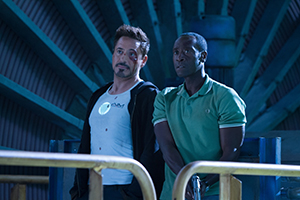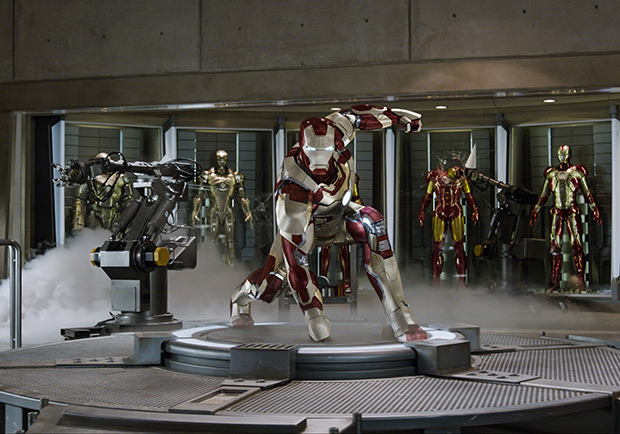The summer movie season is here, and here come the big guns, starting with Michael's Bay's Pain & Gain and the third installment in the Iron Man series. (It could also be the last in the series, but who really knows?)
Both films are about various types of power: physical prowess, the ability to outsmart, the sway of the past over the present, an idea. And how they're made reflects that theme, too—from cinematography to editing to music and special effects (as demanded by blockbuster season). The results are, unfortunately, uneven.
Pain & Gain is, well, an unpleasant movie. Coarse and grisly, it's also instructive in the most bald and trite way. It preaches that crime doesn't pay—but we know that already. It tries to say something about our wealth-obsessed culture, but fumbles the ball.
 Zade Rosenthal / Marvel
Zade Rosenthal / MarvelThree bodybuilders are under the spell of the American dream, or at least a form of it. They believe that strength and hard work should almost by default lead to success—of the primarily financial variety.
Yet they're all weak in their own ways. Daniel Lugo (Wahlberg) is a trainer at a Florida gym who has also served time in the past for fraud. Adrian Doorbal (Mackie) is a customer who needs money to treat his steroid-induced impotence. And Paul Doyle (Johnson), fresh out of prison and a new convert to Christianity, is also a recovering coke addict and unable to stand up against the threat that guys like Lugo and Doorbal pose to his newfound faith and freedom.
As the supposed brains of the outfit, Lugo proposes that they kidnap a wealthy target and convince him to sign over his wealth. No one will get hurt, he promises Doyle. He knows what to do—he's seen it a million times on TV. The group's target is Victor Kershaw (Tony Shalhoub, in a role about as far from the lovable detective Monk as you can get), who manages a Schlotzsky's and has a few other ventures that feed him cash. He spends his workout sessions with Lugo bragging about his success, unaware of the mental notes Lugo's taking.
Of course, there wouldn't be a story here if Lugo's plan went off as smoothly as he promised. The gang bungles two attempts. When they finally do get Victor, he's made of tougher stuff than they imagined. Eventually, they get his money, but only after almost two weeks torturing him in an abandoned warehouse stocked with sex toys.
Things are fine for a while, but when the money starts to run dry, the trio has to look for another target—this time the kingpin behind a lucrative phone sex operation. But if things went from bad to worse with Victor, they go from bad to deadly this time. And a badly injured but recuperating Victor and a private detective (Ed Harris) are closing in.
This is a true story (we're reminded of that more than once), so we can't outright dismiss the story's seamier aspects. If they happened, they happened.
But what makes it difficult to hang on is Bay's filmmaking. Panache, flair, sizzle—these are all great descriptors for what he brings to a project, but so is sexist and dim. As a director, Bay exhibits all the grace and vigor of one of his bodybuilders doing his normal workout routine. You can imagine a lot of groaning, straining, and sweating, someone ravenous for more adrenaline, piling on more and more until no one in the immediate vicinity is safe.
Bay's movies strut and ogle. They deliver cinematic nutrients in concentrated protein shakes instead of well-balanced meals. And maybe that's fine once in a while, but man can't live on protein shakes alone.
Still, at least you know a Michael Bay movie when you see one, even if what you see there is repugnant. By contrast, Shane Black's Iron Man 3 is stylistically bland. That doesn't mean the movie itself is bad or boring—quite the opposite—but you might wish there was a more assertive personality behind it. Black did great work with Robert Downey, Jr. in the neo-noir Kiss Kiss Bang Bang, but he doesn't quite know how to work with this material (for instance, Joss Whedon, who directed The Avengers—which chronologically comes between Iron Man 2 and this film—with the glee of a kid who's just been told he can have all the candy in the store).
Iron Man 3 opens on a note of loss: three Iron Man suits are swallowed in an explosion. Tony Stark has changed. He's obsessive about building new and improved suits for himself, but he is also damaged in a way that surprises him more than anyone. The battle he fought with the Avengers in New York has made him an insomniac, and for the first time in his life he knows what it's like to have a panic attack. And all of this is putting a serious strain on his relationship with Pepper Potts (Gwyneth Paltrow), who's running the show at Stark Industries now.
It all heats up when the villains emerge. In this corner, with slicked-back blond hair and an easy smile, you have Aldrich Killian (Guy Pearce), a scientist who's learned, with the help of a colleague (Rebecca Hall), how to reprogram the body so it can heal itself. In the other corner we have a bin Laden-esque figure calling himself the Mandarin (Ben Kingsley). The Mandarin sports a long beard, wears ten large rings on fingers, and talks, in Stark's words, like a Baptist preacher. He interrupts TV broadcasts across the country to spout his hateful philosophy and generally threaten the American way of life. And he's been connected (in a chilling plot point) to a series of explosion across the United States, most recently one outside the famous Chinese Theatre in Los Angeles.
Stark issues a direct threat against the Mandarin, of course, stirring up trouble, and eventually finds himself far from home with a dead Iron Man suit on his hands and Pepper captured by his enemies. The newly dubbed Iron Patriot (formerly War Machine, and still played by Don Cheadle) comes along for the ride.
Things are always malfunctioning this time around, and so Stark has to flex his powerful intellect. Turns out he doesn't need money or technology to succeed; he's a capable adversary for Killian and the Mandarin. Black and his co-writer, Drew Pearce, grant a refreshing degree of humanity and dignity to characters who are normally throwaway victims—in a thrilling mid-air rescue, the victims as involved in their own rescue as Iron Man.
But Black and Pearce stumble in their treatment of villains. They seem to be taking a page from Dark Knight director Christopher Nolan, who has successfully removed any trace of fantasy from the source material. But Nolan's characters (good or bad) never lose their center; by contrast, the twist in Iron Man strips the threat from a key character and neuters him entirely.
Of the two—Pain & Gain and Iron Man 3—the latter is far more successful. The overlong Pain & Gain is tainted by Bay's trademark sexism and his penchant for objectifying everything—from women to a bead of sweat dripping off Dwayne Johnson's square jaw. By contrast, when it's good, Iron Man 3 is exactly the kind of spectacle we go to the movies for: it doesn't say anything, but it works in the way blockbuster entertainment should. Pain & Gain takes us through the gutter without giving us anything meaningful in return but truisms.
The Family Corner
Pain & Gain is rated R for pervasive language, a few instances of nudity at a strip club, and some blood violence. We also glimpse some of the sex toys where the gang keeps Victor prisoner. Iron Man 3 is PG-13 and features your standard superhero violence—nothing bloody, but lots of punching, shooting, and explosions. There's also some mild language and a couple of scantily clad women near the end.










